Afren PLC Bundle
Unraveling the Mystery: Who Really Owned Afren PLC?
Understanding a company's ownership is crucial for grasping its trajectory and assessing its potential. The story of Afren PLC, a once-promising oil and gas explorer, offers a compelling case study in corporate evolution and the impact of ownership. From its ambitious beginnings to its dramatic downfall, the question of who controlled Afren is central to understanding its fate.
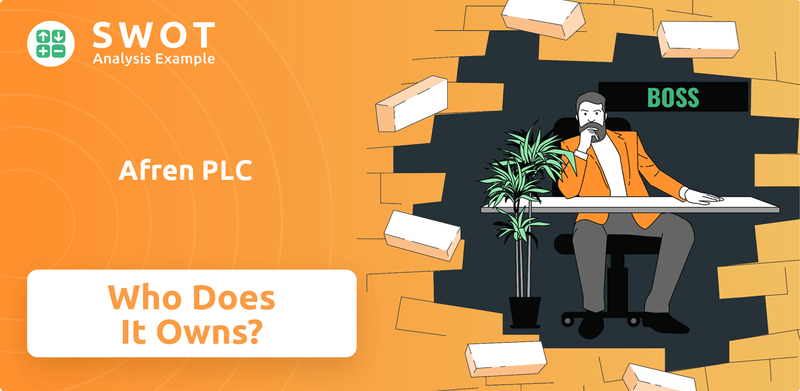
This analysis of Afren PLC SWOT Analysis will explore the company's ownership structure, tracing its evolution from its inception to its ultimate demise. We'll examine the key players, including major shareholders, the board of directors, and the impact of its financial troubles. Discover the details behind the Afren collapse and learn about the ultimate fate of the Afren company and its assets.
Who Founded Afren PLC?
Afren PLC, a company focused on oil and gas exploration and production, was established in 2004. The company's founding was spearheaded by Ethelbert Cooper, a Europe-based West African entrepreneur. Key figures from the oil industry, including Rilwanu Lukman, former OPEC president, also played a crucial role in its formation.
The initial team included individuals such as Osman Shahenshah, Egbert Ulogo Imomoh, and Constantine Ogunbiyi. Shahenshah later founded First Hydrocarbon Nigeria Ltd. Egbert Imomoh, with a background at Shell, served as Non-Executive Chairman. Galib Virani, an early member, was instrumental in securing the company's portfolio and funding.
Afren's business model emphasized partnerships, particularly in Nigeria, to acquire and develop assets. This strategy aligned with the founders' vision of establishing a leading African oil and gas company. The company's rapid expansion followed its IPO in March 2005, growing its portfolio across several African countries and Iraqi Kurdistan.
Ethelbert Cooper, a West African entrepreneur, was the primary founder of Afren PLC.
Rilwanu Lukman, former OPEC president, and Osman Shahenshah, who later founded First Hydrocarbon Nigeria Ltd., were also involved.
Afren focused on partnerships with indigenous companies and host governments, especially in Nigeria.
Afren expanded its portfolio significantly after its initial public offering in March 2005.
Later financial troubles and executive dismissals revealed underlying governance issues.
The company aimed to build a leading African upstream independent oil and gas company.
The early ownership structure of Afren PLC, including the specific shareholding percentages of the founders and initial investors, is not readily available in public records. However, the company's approach to asset acquisition and development, particularly in Nigeria, was heavily reliant on partnerships with local entities and government bodies. This strategy was critical for securing exploration licenses and operational agreements. The company's history, including its eventual financial troubles and the dismissal of key executives, highlights the significance of corporate governance in the context of Afren ownership and the long-term sustainability of the business. For more details on the company's strategic approach, you can refer to the Growth Strategy of Afren PLC.
Afren PLC SWOT Analysis
- Complete SWOT Breakdown
- Fully Customizable
- Editable in Excel & Word
- Professional Formatting
- Investor-Ready Format
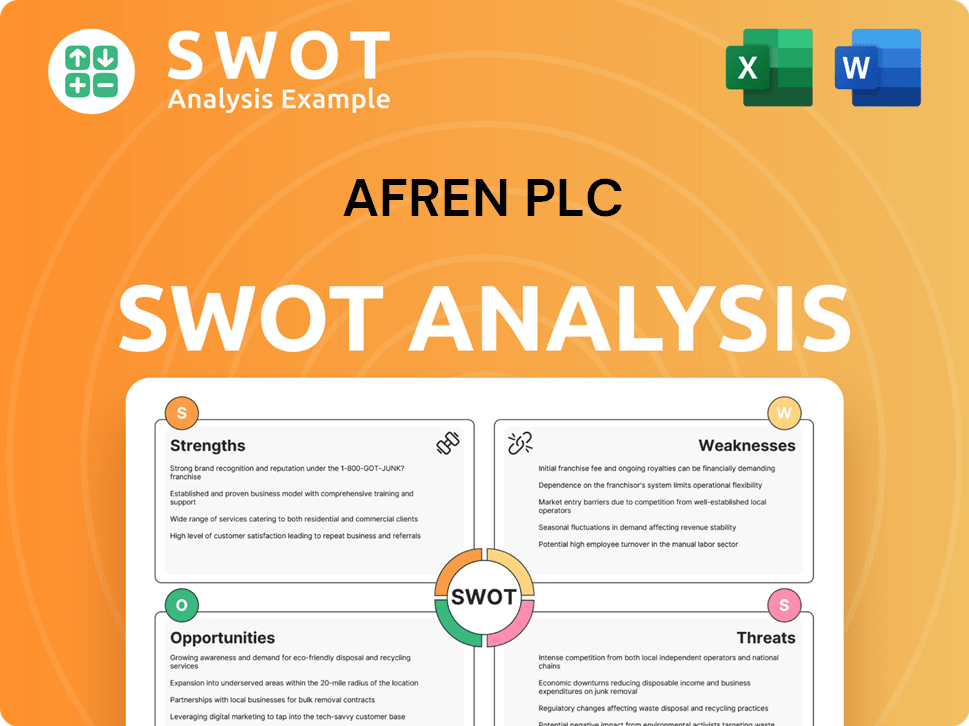
How Has Afren PLC’s Ownership Changed Over Time?
The ownership structure of Afren PLC, a company with a history marked by both success and significant challenges, underwent dramatic changes, especially following its initial public offering in March 2005. The company, which had expanded its operations across various countries, including Nigeria and Iraqi Kurdistan, saw its ownership landscape reshaped by financial distress and strategic decisions. The evolution of Afren's ownership is a critical aspect of understanding its journey, from its early growth phase to its eventual collapse.
Before its financial troubles, Afren's major stakeholders included institutional investors and individual shareholders. However, the company's financial difficulties in 2015 led to a significant shift in its ownership. The company defaulted on its 2016 bonds, and a recapitalization plan involving bondholders injecting funds was proposed. Ultimately, the company's inability to secure sufficient refinancing led to its administration in July 2015, effectively wiping out the equity value for shareholders. The company was subsequently delisted from the London Stock Exchange on August 10, 2015.
| Event | Date | Impact on Ownership |
|---|---|---|
| Initial Public Offering | March 2005 | Established initial shareholder base. |
| Bond Default | March 2015 | Signaled financial distress, triggered restructuring. |
| Administration | July 31, 2015 | Shareholders' equity value wiped out; creditors took control. |
The collapse of Afren PLC serves as a cautionary tale in the oil and gas industry. The company's history, including its Afren ownership structure and the eventual Afren collapse, highlights the risks associated with financial leverage and operational challenges. For more insights into the competitive landscape, consider exploring the Competitors Landscape of Afren PLC.
Afren PLC's ownership structure was initially diverse, with institutional and individual shareholders.
- Financial distress led to a shift in ownership, with bondholders gaining control.
- The company's administration resulted in shareholders losing their equity.
- The delisting from the London Stock Exchange marked the end of Afren PLC as a publicly traded company.
- Understanding the Afren ownership evolution provides insight into the company's downfall.
Afren PLC PESTLE Analysis
- Covers All 6 PESTLE Categories
- No Research Needed – Save Hours of Work
- Built by Experts, Trusted by Consultants
- Instant Download, Ready to Use
- 100% Editable, Fully Customizable
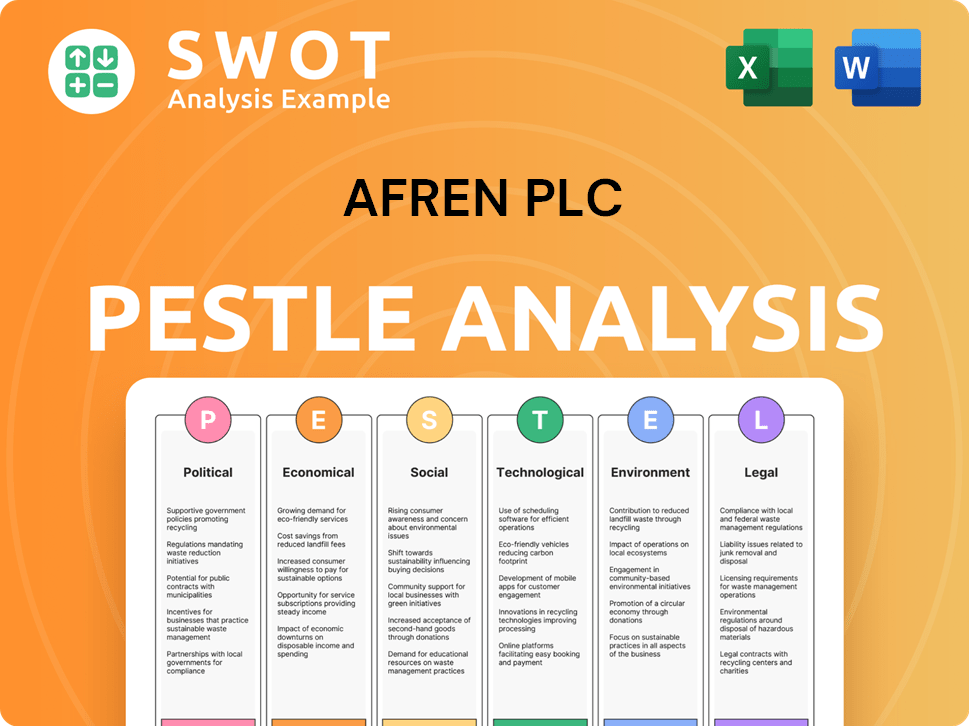
Who Sits on Afren PLC’s Board?
Prior to its administration, the board of directors of Afren PLC included key figures such as Ethelbert Cooper, a founder, and Egbert Imomoh, who served as Non-Executive Chairman and co-founder. Osman Shahenshah held the position of Chief Executive Officer and Executive Director from 2012 to 2014, and Shahid Ullah was the Chief Operating Officer. However, both Shahenshah and Ullah were dismissed in October 2014 following allegations of unauthorized payments from third parties, leading to a significant loss of trust between shareholders and the company. Legal proceedings were initiated against them to recover the money.
The voting structure of Afren PLC, as a publicly listed company, generally operated on a one-share-one-vote basis for common shares. However, the proposed debt-for-equity swap in 2015, which would have given bondholders an 80% stake, clearly indicated a shift in voting power towards the bondholders as they became the dominant financial stakeholders.
| Key Figures | Positions | Notes |
|---|---|---|
| Ethelbert Cooper | Founder | |
| Egbert Imomoh | Non-Executive Chairman and Co-founder | |
| Osman Shahenshah | Chief Executive Officer and Executive Director (2012-2014) | Dismissed due to unauthorized payments |
| Shahid Ullah | Chief Operating Officer | Dismissed due to unauthorized payments |
The period leading up to Afren's administration was marked by significant governance controversies and activist investor campaigns. The Afren Shareholder Opposition Group (ASOG), comprising around 600 members and claiming over a 10% stake, actively pushed for a 'No' vote on the proposed debt-for-equity swap, arguing that the terms were unfair to existing shareholders. The trust between Afren and its shareholders was severely damaged by the scandal involving its former executives and compounded by the collapse in oil prices. These events significantly shaped decision-making, ultimately leading to the board's decision to place the company into administration when a revised refinancing and restructuring proposal failed to gain support.
The board of directors underwent significant changes due to scandals and financial difficulties. The voting power shifted towards bondholders during the proposed debt-for-equity swap. Activist shareholders opposed the swap, highlighting the governance issues that contributed to the
- Key executives were dismissed due to misconduct.
- Shareholder trust was severely damaged.
- The company faced challenges from declining oil prices.
- The administration was a result of failed restructuring efforts.
Afren PLC Business Model Canvas
- Complete 9-Block Business Model Canvas
- Effortlessly Communicate Your Business Strategy
- Investor-Ready BMC Format
- 100% Editable and Customizable
- Clear and Structured Layout
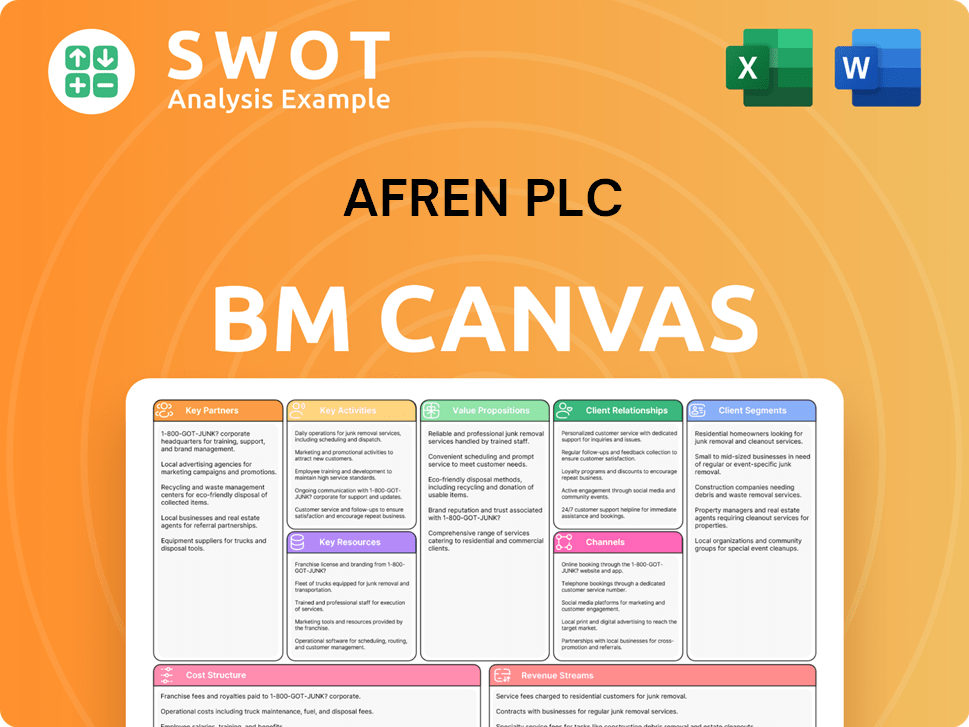
What Recent Changes Have Shaped Afren PLC’s Ownership Landscape?
The Brief History of Afren PLC shows that the company officially entered administration on July 31, 2015. Its shares were delisted from the London Stock Exchange on August 10, 2015. As of 2024 and early 2025, Afren PLC remains in administration. AlixPartners UK continues to act as administrators. The primary focus has been on liquidating assets to repay creditors.
Since the company's collapse, the main trend has been the disposal of assets. For instance, in December 2015, Lekoil acquired Afren's interest in OPL 310 for $13 million. The administrators aimed for a first and final dividend to unsecured creditors by November 2019, but shareholders were not expected to receive any funds due to the substantial shortfall. This highlights the complex legal and financial processes involved in the Afren collapse and subsequent asset liquidation.
In July 2020, the Serious Fraud Office issued a confiscation order for over £5.4 million against former executives Osman Shahenshah and Shahid Ullah. This further underlines the increased scrutiny on corporate governance within the oil and gas industry. This also underscores the legal and financial ramifications of non-compliance, a significant risk for companies in the sector. While Afren's focus is on winding down, these legal battles and financial penalties are a key part of its recent history.
| Key Event | Date | Details |
|---|---|---|
| Administration Commenced | July 31, 2015 | Afren PLC entered administration. |
| Share Delisting | August 10, 2015 | Shares delisted from the London Stock Exchange. |
| Asset Sale (OPL 310) | December 2015 | Lekoil acquired Afren's interest for $13 million. |
| Confiscation Order | July 2020 | Serious Fraud Office issued order against former executives. |
Afren PLC is currently in administration. The administrators are focused on asset liquidation to repay creditors. Shareholders are unlikely to receive any return.
The Afren collapse involved significant financial troubles. This led to the delisting of shares and the appointment of administrators. Legal issues continue to affect the company.
The company's financial difficulties resulted in administration. Asset sales have been the primary activity since then. Creditors are the main focus of the ongoing process.
Legal issues, including fraud investigations, have followed the collapse. Confiscation orders against former executives were issued. These issues add to the complexity.
Afren PLC Porter's Five Forces Analysis
- Covers All 5 Competitive Forces in Detail
- Structured for Consultants, Students, and Founders
- 100% Editable in Microsoft Word & Excel
- Instant Digital Download – Use Immediately
- Compatible with Mac & PC – Fully Unlocked
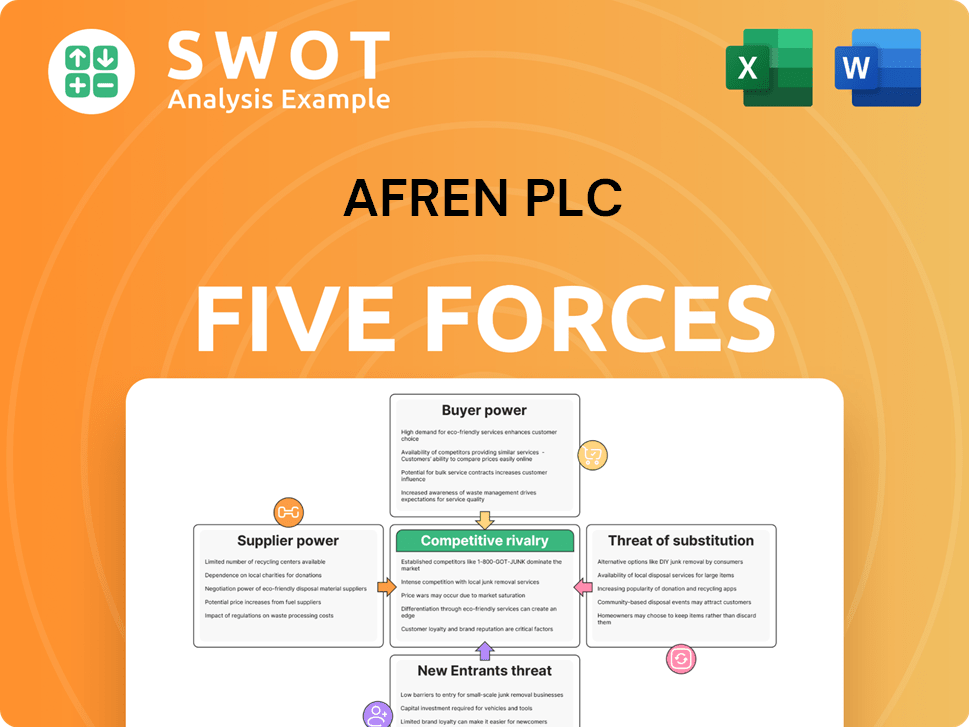
Related Blogs
- What are Mission Vision & Core Values of Afren PLC Company?
- What is Competitive Landscape of Afren PLC Company?
- What is Growth Strategy and Future Prospects of Afren PLC Company?
- How Does Afren PLC Company Work?
- What is Sales and Marketing Strategy of Afren PLC Company?
- What is Brief History of Afren PLC Company?
- What is Customer Demographics and Target Market of Afren PLC Company?
Disclaimer
All information, articles, and product details provided on this website are for general informational and educational purposes only. We do not claim any ownership over, nor do we intend to infringe upon, any trademarks, copyrights, logos, brand names, or other intellectual property mentioned or depicted on this site. Such intellectual property remains the property of its respective owners, and any references here are made solely for identification or informational purposes, without implying any affiliation, endorsement, or partnership.
We make no representations or warranties, express or implied, regarding the accuracy, completeness, or suitability of any content or products presented. Nothing on this website should be construed as legal, tax, investment, financial, medical, or other professional advice. In addition, no part of this site—including articles or product references—constitutes a solicitation, recommendation, endorsement, advertisement, or offer to buy or sell any securities, franchises, or other financial instruments, particularly in jurisdictions where such activity would be unlawful.
All content is of a general nature and may not address the specific circumstances of any individual or entity. It is not a substitute for professional advice or services. Any actions you take based on the information provided here are strictly at your own risk. You accept full responsibility for any decisions or outcomes arising from your use of this website and agree to release us from any liability in connection with your use of, or reliance upon, the content or products found herein.